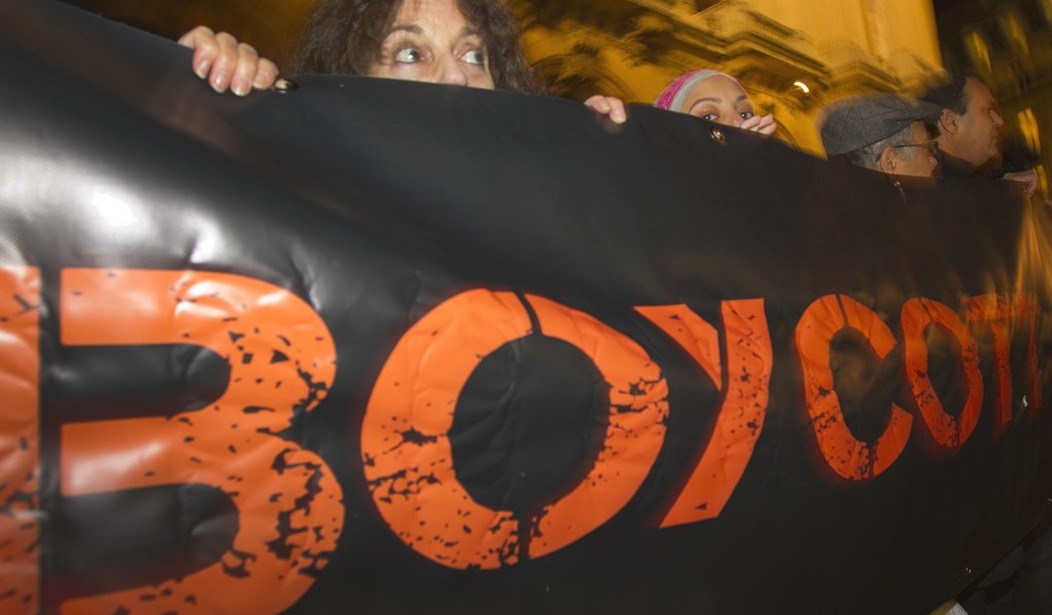I am not one of those people who keep track of the policies, positions and practices of every business they deal with, lest they inadvertently lend support to a cause they abhor or undermine one they embrace. Still, I recognize that consumers who invest time and energy in that sort of discrimination see it as an important reflection of their moral values, which, to my mind, makes it an expressive activity that should be protected by the First Amendment.
The U.S. Supreme Court agrees -- up to a point. But as the debate over laws targeting the anti-Israel Boycott, Divestment and Sanctions movement illustrates, it's not clear where that point is.
Half the states have responded to the BDS movement by boycotting the boycotters, refusing to hire contractors who won't promise not to shun companies that do business in Israel. The Combating BDS Act, a bill introduced in the U.S. Senate last week, aims to protect such laws by eliminating the threat of federal pre-emption.
The American Civil Liberties Union has successfully challenged anti-BDS laws on behalf of a curriculum coach in Kansas and an attorney in Arizona. And, last month, the Council on American-Islamic Relations filed a similar lawsuit on behalf of a speech pathologist in Texas. The ACLU and CAIR argue that rejecting contractors who refuse to sign an anti-boycott pledge unconstitutionally punishes them for exercising their First Amendment rights.
All three lawsuits rely on a 1982 case in which the Supreme Court said an NAACP boycott of white merchants in Claiborne County, Mississippi, aimed at securing "compliance by both civic and business leaders with a lengthy list of demands for equality and racial justice," was protected by the First Amendment. Last year, two federal judges agreed that the BDS movement is constitutionally analogous to the NAACP boycott. The judges issued preliminary injunctions against enforcement of anti-BDS laws in Kansas and Arizona.
Recommended
As supporters of those statutes point out, the Supreme Court has, in other cases, upheld laws that punish or prohibit boycotts. Three months before it decided the NAACP case, the court rejected a First Amendment claim by the International Longshoremen's Association, which illegally exceeded the sanctions imposed by the U.S. government after the Soviet invasion of Afghanistan.
Like the BDS cases, that decision involved international trade. But it also involved federal labor law and what the court called "the delicate balance between union freedom of expression and the ability of neutral employers, employees, and consumers to remain free from coerced participation in industrial strife."
In 2006, the Supreme Court upheld a law that denied federal funding to law schools that discriminate against military recruiters. But that decision hinged on the court's conclusion that such policies are not "inherently expressive," which is not something you can credibly say about the BDS movement, whatever else you may think of it.
More directly relevant is a 1984 decision in which the U.S. Court of Appeals for the 7th Circuit upheld a provision of the Export Administration Act that prohibited American companies from answering questions aimed at enforcing the Arab boycott of Israel. The appeals court viewed the speech at issue in that case as purely "commercial," aimed at maximizing profit rather than expressing an opinion. Again, that is not an accurate way to describe the BDS movement.
Opponents of the BDS movement who strive to legally distinguish it from the NAACP's boycott in Mississippi seem to be driven by political sympathy more than constitutional principle. But the same could be said of the ACLU, which only selectively recognizes economic freedom as a tool of self-expression.
If a curriculum coach in Kansas or a lawyer in Arizona has a First Amendment right to support the Palestinian cause by eschewing certain commercial relationships, shouldn't a baker in Colorado or a photographer in New Mexico have a First Amendment right to support traditional marriage through the same peaceful means? When the right to boycott depends on the cause it serves, it is not much of a right.

























Join the conversation as a VIP Member